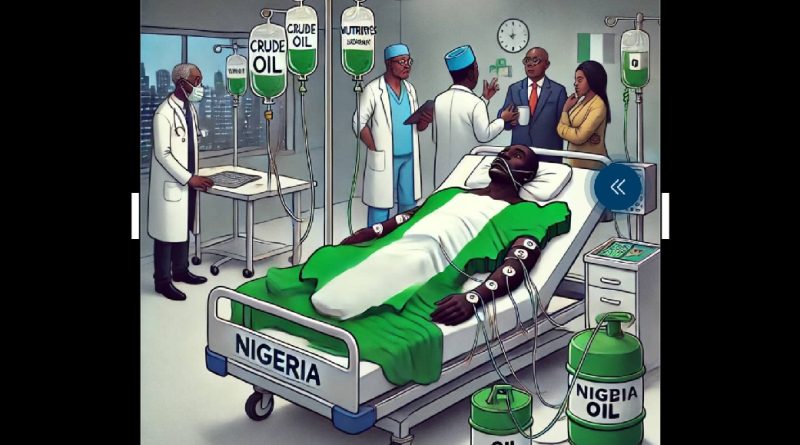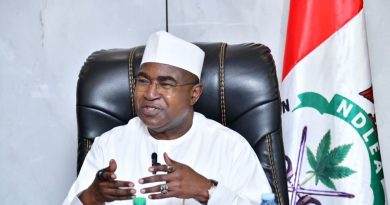NIGERIA AT 64: A Jubilant Fête or a Nation on Life Support?
Perspectives with Dr. Iyke Ezeugo
As Nigeria hits 64, the atmosphere is electric—balloons flutter, drums boom, military and paramilitary parades roll out, and cultural dancers twirl in the squares. Government houses host lavish banquets where politicians toast to a nation “on the rise,” while laughter bounces off marble walls. Yet, the streets tell a different story—gloomy faces abound, navigating potholes the size of the nation’s debt, with smiles as rare as uninterrupted electricity. Is this a birthday party, or should we be rushing our nation to the ICU?
While we pop champagne and dance under the banners of “Resilience” and “Unity,” it feels more like a delusional rave in a collapsing kingdom, with Nigeria—like King Lear—blind to her own decay. Are we celebrating the vibrancy of adulthood, or the bitter decline of a nation stuck in the malaise of its own contradictions? And as the nation dons its party hat, perhaps it’s time to ask ourselves: should we be popping champagne, or wheeling our beloved country into critical care?
A Nation Aged 64: Maturity or Just Old Age?
At 64, Nigeria has supposedly reached a venerable age—a global adult, matured through decades of independence. Like a middle-aged uncle at a family reunion, the nation regales the world with stories of “those good old days,” when Nollywood was birthed, Afrobeats took over the airwaves, and Wole Soyinka’s eloquence was praised in distant lands. But beneath this veneer of cultural success lies the inevitable truth: Nigeria is not just aging; she’s deteriorating.
The triumphs? Sure, they’re there, like the fleeting moments of lucidity in a fading patient. But the reality? The country is unraveling at the seams. While Burna Boy rakes in Grammys and Nollywood churns out its thousandth movie of the week, the infrastructure remains on life support, the education system is in a coma, and healthcare is suffering from a terminal illness. It’s as though we’re celebrating the fact that we’ve somehow managed to remain upright, while our foundation crumbles beneath us.
Nigeria’s Flickering Torch: Achievements Amidst Decay
Yes, Nigeria’s cultural achievements are impressive. Nollywood rivals Hollywood in sheer output, creating a wealth of films that reflect the complexities of Nigerian society. Afrobeats, with its infectious rhythms, has taken over global charts, led by superstars who have transcended borders. These achievements, however, are akin to flickering candles in the wind—glimmers of brilliance struggling against the relentless gusts of decay. It’s as if we’re huddled around a tiny flame, shivering in the cold while pretending the bonfire is still roaring.
Like Plato warned in The Republic, even the most enlightened society can collapse if its leadership is in disarray. Nigeria’s glow may dazzle the outside world, but internally, it is the flickering light of a lamp running out of oil. And let’s not forget that the oil industry itself—once the nation’s lifeblood—has become a symbol of the nation’s toxic reliance on exploitation, bunkering, and corruption.
A Nation in Critical Condition: Diagnosing the Illness
Beneath the surface-level celebrations, Nigeria is more akin to a patient with multiple organ failure, kept alive by external interventions. The once booming economy is staggering, dragged down by corruption, mismanagement, and a staggering debt burden. Elections, which should be a democratic triumph, have become a theatre of the absurd—where political fraud and violence dominate, ensuring that true representation remains a pipe dream.
Public education? Faltering. The youth are left to fend for themselves in a system that’s less about preparing future leaders and more about creating disillusioned graduates without prospects. The healthcare system? A complete paradox: a hospital too sick to heal its patients. And the environment? Nigeria’s oil-rich Niger Delta has become a festering wound, oozing with pollution and degradation, a metaphor for the national body politic—once thriving, now riddled with disease.
Dancing on the Brink: A Celebration or a Eulogy?
And so, the dance continues. Like revelers in a burning ballroom, we twirl and spin to the beat of denial, oblivious to the inferno creeping in. Should we be celebrating at all? Or perhaps the more fitting question is: What exactly are we celebrating? Survival? Mere existence? If that’s the case, we might as well throw a party for a car that’s managed to sputter along with no fuel, no tires, and no steering wheel.
Much like King Lear, who lost his mind while his kingdom collapsed, we’re busy raising our glasses, unaware of the rot beneath our feet. Nigeria isn’t just ill—it’s in the ICU, clinging to life, while we plan fireworks for a patient who may not see the morning.
A Call to Urgency: Beyond the Pyrotechnics
Aristotle once said that the state exists “not merely for life, but for the sake of living well.” If we were to take this wisdom to heart, our celebrations would be more than just a chance to blow up fireworks and perform chest-thumping speeches. True celebration demands introspection—a moment to acknowledge our ailments and embark on the long road to recovery.
To honor Nigeria at 64, we need to address the rot at the core:
– Root Out Corruption: No more slap-on-the-wrist measures. Let’s bring real accountability, not the usual performative gestures of commissions and panels that lead to nowhere.
– Fix Security: From insurgents to kidnappers, the nation is besieged. The solution? A genuine, coordinated effort to secure the nation from internal decay.
– Infrastructure Overhaul*: Fix the roads, power grids, and healthcare facilities before the nation grinds to a halt. The time for patchwork repairs is long gone—rebuild from the ground up.
– Educational Revamp: Create an education system that arms the youth with tools for the future, not the obsolete relics of the past.
– Unify the Nation: In a nation of fractured identities, find the common thread that binds us, lest we splinter into irrelevance.
Hope on Life Support: A Glimpse at Recovery
The prognosis may be grim, but hope remains. Like a doctor standing over a critically ill patient, we can choose to either give up or fight for recovery. Nigeria is not beyond saving—but it will take more than celebratory parades and political promises to heal her wounds. As Nietzsche might remind us, hope is a double-edged sword: it can sustain us, but without decisive action, it risks becoming nothing more than a cruel illusion.
So, as we raise our glasses to Nigeria’s 64th birthday, let’s make it a toast not just to survival, but to recovery, to action, to real change. The nation doesn’t need another fireworks display; it needs a transfusion of integrity, vision, and responsibility.
Perhaps then, at 65, we’ll have a true reason to celebrate. For now, though, the dance continues—whether it’s one of hope or delusion remains to be seen.
Dr. Iyke Ezeugo is a Forensic Researcher, a Social Impact Expert, and Satirist who uses his perspectives and parodies to challenge the status quo, spark debates, and inspire fresh perspectives on public affairs through insightful intellectual injections.




